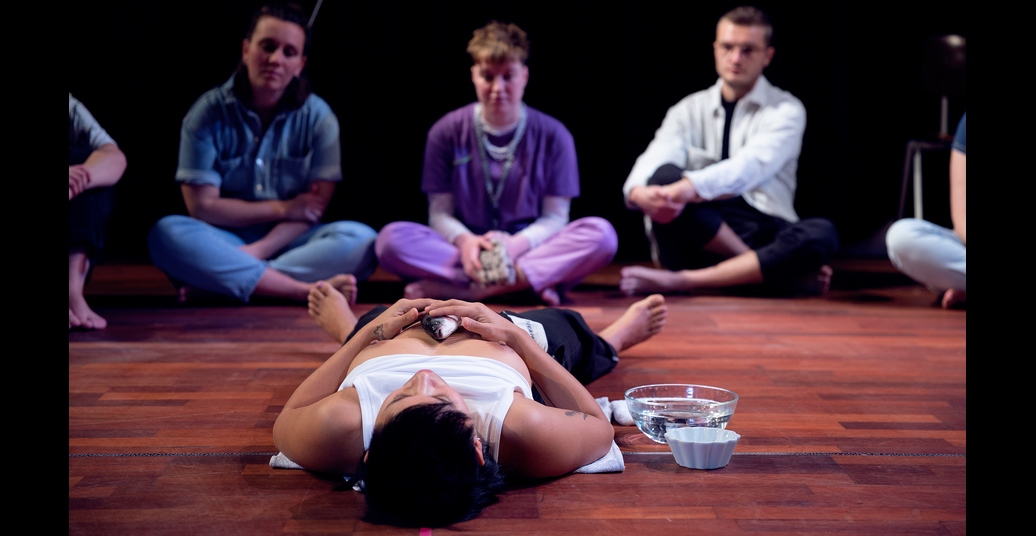Makisig Akin’s “Asian/LOVE”, premiering at DOCK 11 on 3 and 4 February 2023, is a gift—if one you may have to work for.
It’s almost a quarter of an hour past the advertised start time and the doors to DOCK 11’s performance space are still closed. I snuggle deeper into my coat. We are well chilled by the time we begin to shuffle slowly in. There’s a bottleneck effect at the entrance: only a few people seem to come through at a time. Near the back of the line, I’m one of the last in the crowd to see why, though anxious murmurs around me about shoes, socks, and the cold alert me to an arrival ritual. Choreographer and performer Makisig Akin greets us with a gesture towards foot baths arranged on cloth, telling us (with a warm smile) that to start off the performance, “you do the work.” Most of us seem to find struggling out of winter boots and thick socks worth the effort after our initial resistance; there are quiet exclamations of pleasure as bare feet enter the hot water. I linger as long as I can, wipe my soles on the other side, and carry my shoes to my seat.
Once our work is done, for the moment, Akin takes over. They move to a low table where their co-performer for the evening (Inky Lee) lies faceup, torso and stomach exposed. On Lee’s bare ribcage, Akin removes the guts of a fish, placing them in a glass jar from which they’ll be visible hanging above the stage floor for most of the rest of the evening. Akin wipes the skin/work surface clean with a cloth. Stepping through the foot bath has awakened my own skin to a heightened receptivity and I seem to feel more than watch these gentle, slow, tactile movements.
Projections of Babette Mangolte’s film of Trisha Brown’s Watermotor (1978) light up the walls. The ritual beginning is over and the work begins in earnest for Akin, who carries the middle section of the performance with the physical intensity of the scores they’ve set themselves. First up, Akin does their best to follow Brown’s fast and flowing moves, telling us in a breathless aside that “This is just a warm-up for me.” The playfulness with which Akin approaches the impossible task is enjoyable to watch, but the choice to evoke Brown tonight confuses me, the link to the developing throughline of water/fish tenuous at best. Lee circulates through the space, slowly fanning the audience, the footbaths, the jarred fish guts. “I love this part,” Akin exclaims, mirroring the projections; “she’s, like, the boss, you know?”
I experience “Asian/LOVE” as big, too big for its fifty minutes, full of ideas and images many of which are individually powerful and mesmerizing but don’t have enough time or space to develop. This leaves parts of the evening feeling like a grab-bag of stereotypes and trivia. About halfway through, Lee, carried laboriously around the performance space by Akin, vocalizes sounds that move from soft grunts and sighs to wails and screams, exploring a continuum from pleasure to pain, sensuality to trauma. I am transfixed by this section, but it’s over just as it seems to really get going, and we are pulled restlessly along into something new. A question-and-answer score that the performers carry out, in which Lee asks Akin questions that range from the simple (“What’s your favorite color?”) to the descriptive/processual (“What are you thinking about while you’re doing this?”) to the speculative (“What would you be if you weren’t a person?”), is so brief that I’m not sure what it’s possible for the rest of the audience to catch; I only recognize it as a format from seeing Akin’s “GIVE ME YOUR HEART”. No, the real one at Uferstudios last year, in which they used a similar score.
In the “GIVE ME YOUR HEART” version, though, the audience was invited to ask the questions. This participatory register is where I always seemed to feel Akin hitting their stride: in their offers and their asides to us in the audience, their generous ease as a facilitator. The tone of Akin’s invitations is simultaneously welcoming and firm, with vulnerability and humor that make it feel possible to volunteer to be vulnerable too even when you don’t quite know what will be expected of you. It makes participation not only possible, but desirable.
The final section of “Asian/Love” makes good use of this strength of Akin’s. It’s a karaoke party (was the Trisha Brown warmup a form of dance-aoke?). And a group game of the Filipino tubig-tubig, water lines, in which one team has to dash without being tagged past the hands of another team whose members’ feet are symbolically stuck to lines drawn on the ground. And another group game that involves snatching snacks off of grids of sticks lowered just above everyone’s reach. Water lines, dangling food like bait on a fishing line—the fish imagery remains. An audience member chooses the last song of the evening, Vanessa Carlton, and we all sing to one another that we’d walk a thousand miles…Akin’s program notes frame the performance as “a gift from an Asian queer person that will turn the focus around from blaming to treasuring,” in the context of “the development of Asian-hate crimes arising from the pandemic.” This is much-needed and complex medicine with many, many parts; it’s my sense that “Asian/LOVE” tries to tackle too many of them in this iteration of the work. But the generosity and genuine care of the gift is palpable. We in the audience have to work both to start and end the performance, and the reward is pleasure, fun, and community spirit. To treasure someone, Akin is gently reminding us here, is work; but it’s worth it.
“Asian/LOVE” by Makisig Akin (Direction/Choreography/Performance: Makisig Akin. Performance/Music: Inky Lee. Research collaboration: Ryuta Iwashita) premiered on 3 February 2023 at DOCK 11.




